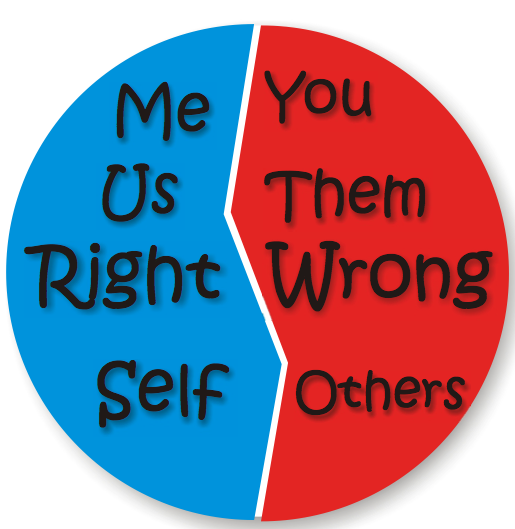Last week, I and a few others in my group gave a presentation to the NYC office of Waggener Edstrom about digital storytelling, social media and findability. One of the points I made sure to focus on was the gradual decline in ‘us vs. them’ thinking. The same isolating fear-based separation that leads to war, depression, loneliness, and a lot of the suffering that goes on in the world is alive and well in business.
Historically, it was very easy for business folks to think of their customers as ‘them’. “how do we get them to buy our product,” people would say, and the answer would often be tactical guesswork, and not lead to particularly effective results. By beginning the strategy by specifically excluding ourselves and everyone we know, we find that we don’t really leave ourselves with anything to base our strategy on.
In the time when you could safely assume that a significant portion of the country was tuned in to a single piece of entertainment (The Tonight Show, etc), putting a message, any message in front of people would get some return. The talk-to-everyone-to-reach-a-few days are gone, and good riddance. They’ve been replaced by endless permutations of clusters of people passionate about an endless combination of things, each making their passions known and eagerly anticipating the opportunity to connect, share, get and give value.
The true power, the true awakening, the most effective conversations, marketing, communications, PR, interactions come when we realize and recognize the simple fact that there is no ‘them’. It’s never been more apparent in the history of the world that across geographic, cultural, language, economic and all other barriers, what we all seek under all of our pretense, suffering and assumptions is connection, support and compassion.
Those that realize that we’re all in this together and keep that fact in mind when looking at ways to connect with those around them, to truly listen and engage with people, to provide value, and to empower people will exist happily for a long time.
In spiritual life this connection to the world is essential to feeling at peace. Different religions suggest different methods of achieving this, from giving to charity, to loving thy neighbor as thyself, to what the Dalai Lama calls Wise Selfishness. If you’ve ever been depressed, you may remember a distinct feeling of ‘not feeling like part of the world’, isolation, distance from people who care about you. You may also find your focus turned exclusively inward, unable to include others in your day-to-day life in conversations about anything other than how awful you feel. This is a horribly lonely place to be, and does not result in any kind of engagement with you being at all inviting. It may be valuable to compare this state of mind with business practices of a company you work at or are interested in.
In the same way that feeling like part of the world leads to our personal successes, it is such with business as well. Even in the distant past, some of the most successful campaigns on behalf of business happened when the company was able to focus outward. Avon and Tupperware built their empires with this mindset. Being inclusive and thinking of all individuals as people who could potentially rally around a common cause connected to making their lives better is the only way to succeed.
In other words, there is no ‘them’. There is only ‘us’. That’s the secret.
[Science backs me up on this, by the way: There’s a whole school of thought on what’s called “ingroup favoritism“]
Header Credit: Strangling Statues by David Sim






[…] order to “reach” the rest of them, I often think a post entitled “how social media will make you money” would be hugely […]
[…] From The Toxic Myth of Us vs. Them […]
[…] From The Toxic Myth of Us vs. Them […]
Brilliantly put sir!
[…] It’s a selfish, indulgent, isolating, base  activity acted upon purely for the benefit of oneself.  It’s based on the toxic myth of ‘us vs them’. […]
[…] as best I can to avoid us vs. them thinking in my own head through connecting with people has really led me to begin to see the patterns (the […]
[…] In fact, taking a stance “above” or “apart” from the rest of the community will only detract from people’s willingness to engage. Nobody likes to feel like ‘big brother’ is there, or that they’re being talked down to. This is another example of ‘us vs them’ thinking. […]
[…] billion of us can connect with each other. Â Can we save the planet? Make each other laugh? Remove the concept of ‘the other’ from our vocabularies? From our children’s vocabularies?” Â Those discussions are […]
[…] as my colleague Jeremy Meyers points out is the wrong argument. It’s an Us vs. Them argument. There is no “Them” there is only Us. It doesn’t matter if we’re trying to […]